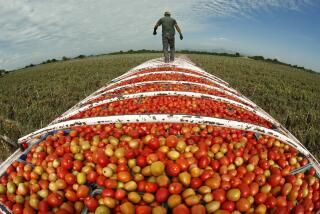Ex-tomato magnate pleads not guilty to antitrust charges
- Share via
Former tomato executive Frederick Scott Salyer pleaded not guilty Tuesday to antitrust charges filed by the federal government alleging a wider conspiracy to inflate prices for tomato products.
The charges — part of a federal grand jury indictment unsealed last week in Sacramento — allege that Salyer conspired with others to fix prices or rig bids on moldy, overpriced tomato products that were sold to customers of his company, SK Foods.
Nearly 95% of all tomatoes grown in the U.S. are processed by five companies in California, including SK Foods, which has two Central Valley plants. Salyer’s alleged co-conspirators were not named in last week’s indictment.
The indictment replaced a prior grand jury action and includes charges of racketeering, wire fraud and obstruction of justice that were already pending against Salyer.
Salyer, who was arrested by federal authorities in February at John F. Kennedy International Airport in New York, is being held at Sacramento County Main Jail. Tuesday’s court appearance — one of more than half a dozen Salyer has made in the case so far — came as the 54-year-old is appealing the multimillion dollar bail set by U.S. District Judge Lawrence K. Karlton.
Malcolm Segal, Salyer’s defense attorney, told Karlton that he is restricted from adequately defending his client in such a massive case while the former executive remains jailed.
“We have to mount a defense against the full force of the government and review at least 2 million documents,” Segal said after the hearing. “I may have to ask for additional time.”
The case, which began as an investigation into California’s tomato processing industry, is part of a far-reaching governmental scrutiny of the country’s food sector. Criminal probes and civil antitrust litigation have targeted U.S. egg processors, dairy companies, chocolate and candy makers, citrus firms and seed developers, among others.
The Justice Department and the U.S. Department of Agriculture’s Grain Inspection, Packers and Stockyards Administration also are investigating whether the handful of large meatpackers that slaughter most of the country’s cattle are illegally manipulating meat prices, according to a group that represents independent beef producers.
“They’ve interviewed and met with a number of our members. And we’ve submitted volumes of material that show our domestic markets are broken because of this monopoly,” said Bill Bullard, chief executive of Ranchers-Cattlemen Action Legal Fund, United Stockgrowers of America. “All the questions they’re asking are clearly in the context of an investigation.”
More to Read
Inside the business of entertainment
The Wide Shot brings you news, analysis and insights on everything from streaming wars to production — and what it all means for the future.
You may occasionally receive promotional content from the Los Angeles Times.









